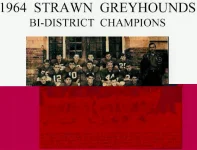Old Bearkat
Six-man expert
Some out-of-state 6 man history. I posted this in the original thread way back when....
North Dakota State University -- NDSU Agriculture Communication
7 Morrill Hall, Fargo ND, 58105-5655, Tel: 701-231-7881, Fax: 701-231-7044
[email protected]
Plains Folk: Six-man Football was a Part of Regional History
Tom Isern, Professor of History
North Dakota State University
Stories of six-man football on the northern plains keep coming in, some of them collected into a paper by Nathan Sand, the fellow who started this line of discussion. It all affirms that this was a chapter in regional history full of meaning to participants, who sense they were part of something distinctive.
A key booster of the game in North Dakota and nation-wide was A.W. Larson, school superintendent at Sykeston. For the Athletic Journal he wrote that six-man "provides on a smaller scale all the thrills, fun, and excitement of the game."
American Boy magazine, published in Detroit, took a keen interest in the game, naming All-American teams in the early years, a form of recognition in which the Dakotans, pioneers of the six-man game, fared particularly well. In 1937, for instance, American Boy named Richard Beck, a halfback from Haynes, N.D., to its All-American squad. In 1938 Eugene Rothstein, a quarterback from Haynes, was so honored. The magazine also named the 1939 Starkweather team one of the top 10 in the nation.
Many local players and fans, once introduced to the six-man game, preferred it to the standard 11-man. Commenting on this trend in North Dakota, American Boy explained, "In the older game the center, guards and tackles carry much of the drudgery of the game while the ends and backs make the scores and get the cheers and headlines. In six-man there are no drudge jobs... Everybody carries the ball in six-man! Everybody scores! The glory and the fun are passed around."
Sometimes even reluctant participants got in on the action. Nathan Sand recounts a story told him by Duane Voigt about the 1951 state title game, Elbowoods versus New Salem. Elbowoods put the student manager into the game, even though he was terrified of being hit. He lined up where he thought he would be away from the action, but a pass bounced off another player's shoulder pad and into his hands. The startled boy then ran for a touchdown and kept right on going--off the field and out of the facility. Someone finally stopped him and brought him back, because he had the only available game ball.
Leo Reinbold, who played for Hebron, told Sand about the 1950 title game with Elgin. In the second quarter the team from Hebron already was ahead by 51 points. The team from Elgin, recognizing a hopeless situation, quit and went home. This was not an uncommon development in those days of high-scoring contests. Reinbold told Sand "he couldn't remember playing the second half of a game during his senior season."
Six-man also appealed to community boosters, because it brought people to town. "The playing of six-man has a tendency to hold people in our community rather than for them to go elsewhere for their entertainment and shopping," wrote Larson in 1938. "Local business, especially, is enthusiastic about the game. Our games are important events in community life."
In the long run football could not save a town doomed by larger economic forces and social desires, but six-man was great while it lasted, and it its partisans recall it with something more than nostalgia. Six-man football does not loom so large in regional myth as homesteading or the dust bowl, of course, but those who knew it claim for it a place in the regional story as a representation of prairie life--wide-open, full of opportunity, inventive, fun-loving.
Before me rests an inch-thick compilation entitled "The Glory Years: Six-Man Football in North Dakota (1936-1941)," by Neil Wenberg, formerly of Donnybrook, N.D., now of Harmony, Penn. This is an impressive and meticulous piece of research, which must inspire to the uninitiated the question, "Why?" And why have so many people written in with their recollections of the game? Because there is something in this experience that they know, even if they can't quite articulate it, defines them as plains folk.
###
Source: Tom Isern, (701) 799-2941, [email protected]
Editor: Gary Moran, (701) 231-7865, [email protected]





